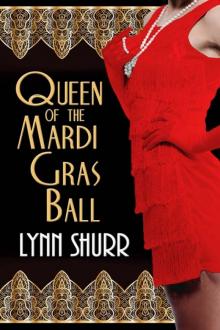- Home
- Lynn Shurr
Putty in Her Hands Page 3
Putty in Her Hands Read online
Page 3
“Do you stay on the job regardless of the weather? That seems inefficient,” Remy said, and immediately drew a defensive remark from Sol.
“Hell, no. We go back to the city and do some small jobs. Most of the older homes in New Orleans have plaster walls, even the little places. With all the oyster shells around, they made their own lime in pits way back to do the job. We found horsehair in Alleman’s walls used to bind the plaster. You could still tell it came from a brown horse or maybe a mule. Now, it mostly comes with wood fibers.”
“Enlightening.” Remy Brossard spooned his gumbo and offered the accompanying potato salad to anyone who wanted it. Julia felt a trifle embarrassed when Sam took him up on the offer after his gargantuan meal.
The bread pudding arrived swimming in a sweet sauce. Sal pressed half of his dessert on Julia. “You can’t do heavy work on a salad.”
She pointed out they weren’t working today, but she ate it anyway. So good!
The final check came, a hundred dollar plus whopper. Three credit cards belonging to Sal, Julia, and Remy hit the table. Sam shrugged. “We each have a company card. Doesn’t matter which of us pays.”
“I insist,” said Remy Broussard. “I invited Julia, Ms. Rossi, to dine here and am happy to include her coworkers.”
The uncles did not fight his offer, nor did Julia. This was a business luncheon, or should have been, not a date. Mr. Broussard could write if off on his taxes just as Regal Restorations did. Too bad Sal and Sammy didn’t forget about the offer to tour the Black Box.
“You lead the way. We’ll follow.” Sal jingled the keys to the second Regal Restorations truck they had at their work site, same gray color but closer to silver than the one Julia drove, and newer. Its Regal Restorations logo still stood out with the royal blue lettering topped by a crown while her vehicle’s sign had long since peeled away.
They followed the red truck out of the shell parking lot, made a left at the bridge, a right by the vast cemetery, then drove along the bayou until they came to a lengthy paved drive guarded by two massive live oaks of distinguished age and a metal electric gate. They had arrived at the Black Box.
Chapter Four
It pleased Julia to see that Remy Broussard wasn’t entirely nontraditional. He’d planted the way with young live oaks that would eventually form an impressive alley, but not in his lifetime. She noted he’d placed a parking pad with a two-car garage and storage shed off to one side in order not to conflict with the sleek, dramatic presentation of his home. He’d also boxed in his narrow lot running from the road to the bayou with metal pipe fencing matching the stark modernity of the house. A couple of chestnut horses grazed on one side of the fence and a decrepit trailer occupied the lot on the other.
They parked on the pad and paused to gaze up at the black monolith. “Cool,” said Uncle Sammy.
“I don’t trust this guy,” Uncle Sal whispered in Julia’s ear.
Entering through a door only distinguishable from the glass exterior by a silvery handle, Remy showed off his efficient office space sporting a wall of diamond-shaped cubbies filled with rolls of architectural plans, the latest in computers and specialized copiers, plus a traditional drawing board, and modern glass-topped desk scattered with small sculptures. A few sketches of a project filled a corkboard. The Regal Restorations team took a long look at that.
“Sort of similar to this place but laid out in a connecting row of diamonds,” Julia observed.
“Exactly. Ultramodern condos the like of which Chapelle has never seen before,” Remy said, enthusiasm warming his voice.
Julia shook her head. “I can’t see much market for them in this small town, and retirees won’t want a three-story home; too many stairs.”
“What she said,” Uncle Sal agreed.
“The end units are three-stories, but the rest run crosswise, three layers of apartments with elevators, of course. Bayou views, close enough to town for shopping and taking advantage of the many local festivals, restaurants, and the little theater. Not far distant from Lafayette if you want more action.” Remy Broussard had his sales pitch memorized.
Uncle Sammy nodded. “I could dig it. Yeah, I could live there.” Through his own lack of restraint and his wife’s strict Catholicism, he and Aunt Franny had seven kids, some grown and out, four still creating chaos at home. He liked being away on a job a little too much. Julia glared at him for betraying their bread-and-butter business. Renovate and restore; don’t build new.
“Let me show you the rest of the place.” Their guide led the way to a metal staircase almost industrial in style. “The plumbing core runs up alongside the stairs, half-baths on the first and second floors, and a full on the third.”
They clanged to the second floor in their work boots and emerged next to a kitchen and dining area, all open floor plan. A freestanding fireplace vented to the outside, stood across the way surrounded by black leather sling chairs and a sofa of the same material accented by a few red pillows. Remy flicked on recessed lighting that made table lamps and electrical cords running across the floor unnecessary. A pewter-toned contemporary chandelier hung over the dining table. The white subway tiles of the kitchen backsplash reflected its light. All the appliances were stainless steel and the counters black granite flecked with white. A small bar stood ready to fill the round metal cocktail tables scattered around with a variety of drinks or wine from the rack.
“No laundry area?” Julia asked, criticism in her voice.
He heard it. “There’s a washer and dryer stacked in that cabinet. I send most of my stuff out to be laundered. The cleaning lady does the rest.”
“A true bachelor pad.” She’d noted even his worn jeans had been pressed.
“Step out on the balcony. You’ll love the view.”
Julia opened the sliding door and moved to the curved smoked Plexiglas topped with a metal railing enclosing the space, which held deck chairs and more of the little tables for drinks. “You can see Alleman from here, almost eye to eye with its second-floor gallery.”
From the site where they’d been working, the metal railings of the Black Box made two shining slashes across the modern building which threw a dark shadow over the bayou below. Yes, that bamboo should give Mr. Getty his privacy. Uncle Sal tested the railing for stability and found it solid. He grunted but conceded nothing.
“The third story balcony provides shade for this one, but you can catch the best breezes up there or take a tan.” Remy took them back to the staircase, the one that lit up at night, and showed the way to the next level, his bedroom. “Feel free to explore the bathroom. Esther cleaned this morning. It should be presentable.”
Julia, always a sucker for a nice soak which she rarely got on the job, opened the double doors exposing a large, well-lit mirror placed above twin sinks set in the same granite as the kitchen. In its own room on the right, a freestanding tub big enough for two sat on a pedestal. Small baskets containing fragrant soaps, fizzy bath bombs, and soft washcloths sat around the base. A heated towel rack held, what else, thick black towels, and a private commode hid behind a half wall. Off to the other side of the sinks, a clear glass box of a shower had its own space, and beyond that lay a closet hiding a toilet. Her gaze returned to the tub, and she emitted a soft sigh she hoped no one heard.
Making room for the uncles, Julia returned to the bedroom, attempting to avoid staring at the king-sized bed covered in a black satin quilted duvet cross-crossed by a zebra hide, and a stainless-steel headboard which mimicked brass beds of old. She stared anyhow. As Sal flushed the toilet to check the water pressure, Remington Broussard came up behind her. His closeness made the hairs on the back of her neck prickle and her nipples harden.
“Like it?” he asked.
“You kill that zebra yourself?” She hoped a little snark might chase away the sensations he provoked.
“No. The decorator said this room needed some striped relief from all the black. She swore it wasn’t an endangered species like the Grevy’s
zebras they have at the little Acadiana zoo.”
Julia had to agree with the decorator. Even the two nightstands were black lacquer standing out against the prevailing neutral pale gray walls. She moved away to escape his body heat.
Out on the second balcony where a nice, cooling breeze blew as promised, sat a double lounger, a hammock on a stand, and more of the small metal tables he must have bought in a wholesale batch. Again, Remy approached from the rear, this time caging her against the railing with his arms as she took in the view, though he didn’t touch her. Julia refused to flinch or retreat, but if he kept this up, she’d give him an elbow to the gut. She’d dealt with plenty of aggressive construction workers in her line of business.
Instead, she said, “You can see the Bayou Queen from here, her upper stories, and make out where the path from the dock ran.”
“I cleared that. Usually I take my boat up the bayou when I want to survey property rather than fight the undergrowth.”
“Wise idea. I should have brought a machete instead of a crowbar.”
The balcony door slid open. His arms dropped. He stepped back. Julia exhaled as Sam entered the space and stared down as well as out. “Hey, that’s a nice dock right off your office and a boat. She looks pretty speedy.”
“She is. I could use her to water ski if I wanted to chance the bayou water. Mostly, I just tool around. You get a whole different view from the water.”
“You ever grill out on the dock?”
“Occasionally.”
“Yeah, I could see myself in that hammock, a nice big burger on the table, a brew in my hand.”
“This is my favorite space too.”
“But not a family home with only one bedroom,” Julia said, breaking up the love fest between Sam and Remy.
“It wasn’t intended to be. The bedroom is large enough to be split into two if necessary, but I’d really hate to do that.”
“I’ll bet you would.”
Sal joined them. “Hey, you can see that old hotel Jules explored today.”
She wanted to thank her uncle for opening the subject again. “Imagine if that place were beautifully renovated, and the gardens planted again. What a picture the Bayou Queen would make lit at night with her reflection glittering in the water. Put in a new dock, and boaters could stop for a drink or lunch. If a reception or ball were held there again, she’d be ablaze with light. That’s something to be proud of, something you’d save for posterity, yours and others, like planting those young live oaks along your driveway.”
Remy met her challenge. “What if I want to make the buildings of the future instead of preserving the past?”
“Surely you could find undeveloped property to do that. Lots of cane fields around here with plenty of room. Buy one of those.”
Remy snorted. “You really are a city girl. People around here hold onto their land whether it’s in use or not. The daddy or granddaddy or great-granddaddy left them that land. All the heirs must agree to sell, and believe me, those families are large. Right here, this is my tiny piece of family land carved out of a cow pasture my paternal great-grandfather, a man they called Tubbs, left his children, all seven of them. My grandmother nagged granddad to let me purchase his sliver to entice me into moving back to Chapelle because land is so expensive around New Orleans.”
“You got that right,” Sam agreed.
Remy expanded his arms, pointing from one fence to the other. “A second cousin lives in that trailer. Another one grazes a few horses on his share. Finding a plot large enough for a big project is nigh well impossible, and if you do, it might take years to get all the heirs to agree to a sale and the price. I got the Bayou Queen property for a pittance at the tax auction. Another deal like this won’t come along any time soon—if ever.”
Julia played her ace. “I had coffee with your grandmother and great-aunt at the bakery. They are both in favor of seeing the Queen restored. Wouldn’t you like to make them proud?”
Remy threw back his head and barked out a hard-edged laugh. “So that’s where you found out about the Queen—and me. Those two are already proud. You think I haven’t had to listen to their tales of past grandeur over and over. My grandmother married down, taking on Guidry Broussard, a country lawyer whose main clients were his own disreputable kin. She polished him to a shine and got his family to back him in a run for mayor. He won three terms. His pride and joy is bringing Hartz Technology to town, though most people think Jonathan Hartz moved here because he fell in love with and married a Cajun girl. Believe me, Patty Broussard still likes to manipulate people. If one way doesn’t work, she’ll try to destroy her opponent with vicious gossip. When my mother wouldn’t bow down to her, she started rumors of an affair going on behind my father’s back. He moved us and his law practice to Mandeville to get away from her.”
Considering the outburst, Remy felt little affection for the woman who had gotten him this land. Julia backed up a little, but didn’t concede. “Whatever Miss Patty has done in the past doesn’t make her wrong about the Bayou Queen.”
He ignored her statement. “You know what I see when I stand here? My row of Black Diamonds condos reflected in the water. Accept that’s the way it is going to be.”
“Maybe not. We’ll have to see about that.” She’d gone into stubborn mode, her hands on her hips. Her uncles said she could be harder than plaster, more like concrete, once she set on a course.
Uncle Sammy checked a rugged watch nestled in his black arm hair. “Time to go, Jules.” He’d extricated Sal from more than one tight spot with timely exits, and Julia suspected he did the same for her now.
She decided to exit gracefully before she lost her temper. Sal grumbled about not having time to fully appreciate the view from the third floor. “The same as the second only higher,” she snapped. He raised his russet eyebrows at her as they charged down the staircase and retreated to their trucks. Remy Broussard followed, getting ahead of Julia on his long legs. He opened the door for her and offered her a hand up again, one she didn’t need.
“Maybe you’d like to stop by this evening and see the stars from the third-floor balcony. I could crank up the grill, make a couple of steaks, uncork a bottle of wine.”
“No, thank you, Mr. Broussard.”
He was quick to say, “Remy.”
“I have other plans.”
“Maybe another time.”
“Perhaps.” Julia shut the truck door and turned the engine over. She did have plans to make and people to call—to save the Bayou Queen.
Chapter Five
After the Rossis left, Remy went to his office, awakened his computer, and tried to work on the specifications for a project, but his mind kept straying to Julia. Contrary to popular opinion, he didn’t care for easy women and preferred a challenge. He’d earned his reputation during his teen years while being forced to spend summers in Chapelle, a pretty dull place for a guy who grew up across the lake from New Orleans. His parents had made some kind of agreement with his grandparents long ago when they fled this town and its nasty gossip. So, he’d endured having his grandmother pressure him to commit to a career in law in order to mold another successful politician.
Sitting in the mayor’s chair while his granddad worked was fun as a child, not so much as a teen. When he acted out, Mayor Broussard took him fishing on Indian Lake and told him he understood. The Broussard in Remy was coming out, but he must understand he had a grander future than settling down early with some gal he’d gotten pregnant. Even if he went on to college, the whole town would remember what he’d done and to whom, killing any chance of public office. That lecture didn’t prevent Remy from running amok among the loose girls of Chapelle, but he took care to carry condoms.
With a great deal of teen sulk, he’d replied, “I don’t want to hold public office. I plan to be an artist.” He’d held up his sketchbook, showing Guidry Broussard a remarkable likeness of himself done with the charcoal that blackened Remy’s fingers. Like Julia, he didn’t mind
getting his hands dirty.
“Excellent work, but not very practical unless you plan to spend your life sketching tourists on Jackson Square,” his grandfather said.
By the time he graduated high school and got into Tulane, Remy realized this to be true. The Broussards were nothing if not practical realists and opportunists. Asserting himself, he selected a major in architecture and went on to pursue post-grad work in Chicago, far from family pressures. But as his father warned, the Broussards always found a way to suck you in. He glanced at the deed to the Bayou Queen still sitting on his desk and looked around at the house he’d built on family land.
At least his taste in women had improved. At Tulane, he dated girls from good families, Mardi Gras ball debs with great breeding. The last of those expected an engagement ring upon graduation and received only his decision to leave the area presented at fancy restaurant where he believed she wouldn’t make a scene. Instead, she stood when he did and delivered a girly hit to his balls. It hurt, but not as much as it would have if he hadn’t seen it coming and arched his back. He didn’t return to the city until she’d safely married someone else.
In Chicago, he slept with serious women intent on their careers, not marriage, and sought the same type after coming back to New Orleans. They wanted a handsome escort to society events where they made contacts, furthered their agendas, and enjoyed purely recreational sex. One whom he hadn’t dated exclusively did turn up in the family way. He called her bluff. A DNA test proved him right. She married a man lower down on the social ladder. He had no idea if that guy was the father or not, but he sent both a wedding and baby gift. No sense in making extra enemies.
Remy suspected Julia Rossi fit his type, a strong, career-centered woman—who could probably hit harder than any of his other lovers. He recalled the way she’d held the hammer and crowbar, ready to fend him off even if it meant breaking his skull. That made her a little bit dangerous, and he liked the idea. Let’s face it, her kind was thin on the ground in Chapelle where every young woman appeared to want marriage and children as soon as possible, and even divorcees were on the prowl for their next husband. Any with other ambitions left town right after college.

 Sinners Football 02- Wish for a Sinner
Sinners Football 02- Wish for a Sinner Sister of a Sinner
Sister of a Sinner Courir De Mardi Gras
Courir De Mardi Gras Mardi Gras Madness
Mardi Gras Madness Paradise for a Sinner
Paradise for a Sinner Putty in Her Hands
Putty in Her Hands Son of a Sinner
Son of a Sinner Queen of the Mardi Gras Ball
Queen of the Mardi Gras Ball Love Letter for a Sinner (The Sinners sports romances)
Love Letter for a Sinner (The Sinners sports romances) A Wild Red Rose
A Wild Red Rose Sinners Football 01- Goals for a Sinner
Sinners Football 01- Goals for a Sinner The Convent Rose (The Roses)
The Convent Rose (The Roses) Kicks for a Sinner S3
Kicks for a Sinner S3 She's a Sinner
She's a Sinner